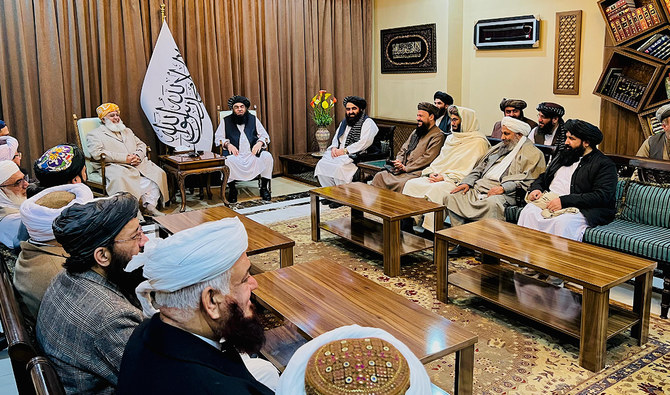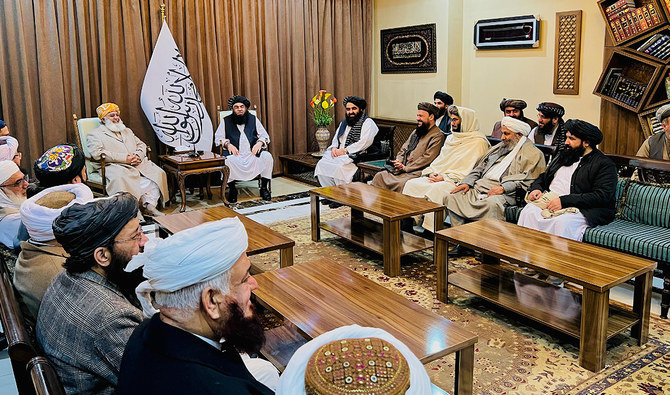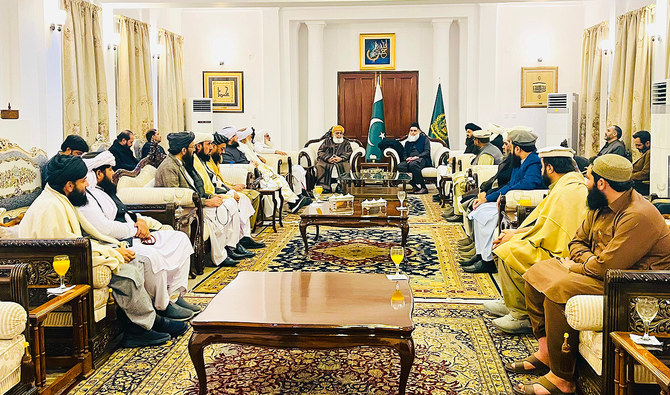ISLAMABAD: The government distanced itself from the visit of a prominent Pakistani religious cleric to Afghanistan on Thursday, saying it was not interested in dialogue with a proscribed militant network launching cross-border attacks against its civilian population and security forces from the neighboring state.
The statement focusing on Maulana Fazlur Rehman’s Kabul visit on the invitation of the interim Afghan government was issued by foreign office spokesperson Mumtaz Zahra Baloch during the weekly media briefing in Islamabad.
Rehman took a private delegation to Afghanistan on Sunday to hold talks with Taliban officials at a time when the ties between the two states are at their lowest ebb due to the rising number of militant attacks in Pakistan.
The Pakistani cleric advocated for strong bilateral relations between both countries against the backdrop of his country’s decision to deport large numbers of “illegal immigrants,” mostly Afghans, in the wake of a surge in deadly suicide bombings.
The government has urged the authorities in Kabul to prevent the militant network, Tehreek-e-Taliban Pakistan (TTP), from using the Afghan soil to launch attacks in its border areas and cities. It also suspect the involvement of unregistered Afghans in such violent activities.
Pakistan’s foreign office distanced itself on Thursday the government was not supporting the visit of a prominent religious leader of the country to Afghanistan while emphasizing it had no interest in opening yet another dialogue with a proscribed militant network in the neighboring state which is said to be responsible for carrying out attacks on civilians and security forces across the country.
“Maulana Fazlur Rehman has gone to Afghanistan in a private capacity,” Baloch told the media in response to a question. “The government is not supporting his visit in any way. Pakistan is not interested in dialogue with the TTP which has carried out several attacks in the country.”
She acknowledged the foreign office briefed Rehman about the situation in Afghanistan before his visit, adding it was a normal procedure.
“Our demands from Afghanistan have not changed,” she continued. “We want action against terrorist groups, including the TTP, in Afghanistan. We want the elimination of safe havens for terrorists in Afghanistan. And we want to prevent the use of Afghan territory for terrorism against Pakistan.”
According to a statement released by Rehman’s Jamiat-e-Ulama-e-Islam (JUI-F) party a day earlier, he held meetings with top officials in Kabul during his visit to Afghanistan.
The statement also maintained Rehman was optimistic about the future trajectory of Pakistan’s bilateral relations with Afghanistan.
The Pakistani cleric enjoys close relations with the Taliban leadership in Afghanistan since his party has also been advocating for Islamic laws and values.
The JUI-F also wields considerable influence in Pakistan’s Khyber Pakhtunkhwa and Balochistan provinces, both bordering Afghanistan.
Government rejects talks with Pakistani Taliban, distances from cleric’s Kabul visit amid bilateral tensions
https://arab.news/9am85
Government rejects talks with Pakistani Taliban, distances from cleric’s Kabul visit amid bilateral tensions

- The foreign office acknowledges briefing Maulana Fazlur Rehman about Afghanistan’s situation, calls it normal procedure
- Mumtaz Zahra Baloch says Pakistan wants the administration in Kabul to take action against ‘terrorists,’ their safe havens
Imran Khan's sons fear for his health, seek visas to visit him in Pakistan

- Pakistani authorities say medical procedures are under way and reject opposition claims of neglect
- Khan's sons say he should be moved to a proper medical facility and have access to private doctors
LONDON: Imran Khan's sons say they fear for their father's deteriorating health in a Pakistani jail and are seeking permission to visit the former prime minister, urging authorities to grant access after more than two years apart.
Khan's lawyer told Pakistan's Supreme Court last week that the ex-cricketer had lost significant vision in his right eye while in custody. A medical board said on Monday the swelling had reduced after treatment and his vision had improved.
Speaking to Reuters in London, where they are based, Khan's sons, Kasim and Sulaiman, 26 and 29, said they were uncertain about the medical report. They spoke to their father on Thursday for the first time since September.
They said their father usually avoids discussing his health, but during the call he expressed frustration, saying he had been denied treatment for his eye for a few months.
"It's hard not to feel low at times because we've been away from him so long," Kasim said of his father, whom he and his brother call 'Abba', adding that he should be moved to a proper medical facility and have access to his private doctors.
Authorities say medical procedures are under way and reject opposition claims of neglect. The Supreme Court has sought details of his treatment.
JAILED SINCE AUGUST 2023
Khan, 73, has been jailed since August 2023 after convictions he and his Pakistan Tehreek-e-Insaf party call politically motivated.
Since his 2022 ouster in a no-confidence vote, he has faced multiple cases, including over state gifts and an unlawful marriage. Some convictions have been suspended or overturned, with appeals pending. He denies wrongdoing.
Kasim and Sulaiman were raised in Britain after Khan's divorce from their mother, British socialite and filmmaker Jemima Goldsmith. They have not seen their father since November 2022 after he survived an assassination attempt. They said they applied for visas last month but have yet to receive a response.
"Maybe the establishment is worried that if we go and see him it would create more noise, and just more attention to his situation," Sulaiman said, when asked why there could be a delay.
The Pakistani embassy in London and Pakistan's foreign ministry did not immediately respond to requests for comment.
Kasim said their immediate concern was his health, but there were other pressing issues, including "his freedom, abiding by correct human rights processes and also the rule of law and just ensuring that he's allowed a proper, fair trial".
Broadcast outlets have been restricted from airing Khan's name and speeches or even showing his image. Only a single court photograph has been publicly available since his imprisonment.
PTI swept to power in 2018 and retains a large support base across key provinces.
For four days, PTI supporters have blocked major highways linking Khyber Pakhtunkhwa to Punjab, stranding thousands of vehicles and affecting fuel and food supplies in some areas.
Asked if they had a message for Khan's supporters, Kasim asked them to "keep faith and keep fighting", adding: "It's the same kind of message we're trying to hold on to."














